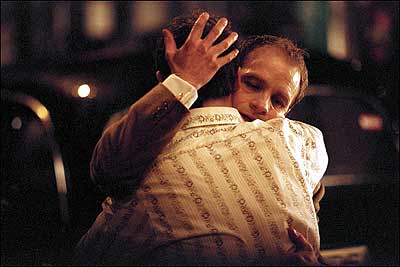Wilbur (Wants To Kill Himself)
Quite simply one of the best films of the year. Nuff said.

There are few films that can come along and in the course of an hour say something that feels utterly true without ever actually setting out their stall. Wilbur (Wants To Kill Himself) not only manages this feat, but in doing so also manages to feel fresh and original. That it's also one of the most fundamentally funny (despite the morbid inference of the title) and touching movies to be released this year feels like a bonus. And it's set in Scotland. Yay!
Fear not, those who have read my review of the still-born cinematic atrocity that is Devil's Gate; as far as the inference of quality is concerned Wilbur... easily falls at the Trainspotting end of the Scottish spectrum, unlike that particular debacle. Essentially a gentle character study, Wilbur... charts the emotional hardships of it's titular hero (played by Jamie Sives), a young Scotsman plagued by hidden insecurities who is frequently compelled to attempt suicide. Beginning with the burial of their father, the movie introduces us to Wilbur and his kind-hearted brother Harbour (Adrian Rawlins lending excellent and largely understated support) as they inherit his rundown bookshop in Glasgow. His concern growing over Wilbur's instability, Harbour insists his brother move in with him whilst he attends a depression support group.
Over the course of the movie it gradually becomes apparent that Wilbur is wanting for the love of a woman. It also becomes apparent that he has no difficulty in attracting the ladies, just in letting them into his life. Typified by his brief relationships with a cleaner at the hospital where he attends his therapy and also one of the female psychologists at the group, Wilbur's inability to nurture an adult relationship is eventually revealed to have stemmed from an incident in his childhood that resulted in him blaming himself for the death of his grandmother. The revelation only arises in the final third of the movie, however, and it's this lack of spoon-fed character exposition that exemplifies the gentle narrative and intelligence with which director Lone Scherfig credits his audience.
Matters become more complex with the introduction of Alice (the increasingly omnipotent Shirley Henderson) and her young daughter Mary (the delightful Lisa McKinlay). Initially drawn to and eventually marrying Harbour, the reclusive Alice is the only woman to eventually crack Wilbur's emotional shell, and the germination of their relationship begins to look like it might upset the bond between the brothers. However, typically for a film that only gradually reveals it's hand, things take an unexpected turn in the latter half of the movie, shifting the focus of emotional weight to Harbour who discovers he has cancer but is determined not to reveal his condition lest it upset the delicate balance of Wilbur's own emotional state.

To give away too much of Wilbur... is to deprive the viewer of the joy that is the unwrapping of a complex but easy to understand character. Working with a hugely gifted cast who are happy to remain largely low-key and allow the viewer to fill in many of the blanks, Scherfig keeps a relaxed but steady hand on proceedings, guiding the movie gently but concisely to it's satisfying resolution. His script, co-written with Anders Thomas Jensen, is a near-masterpiece of subtle character observation, and the faith of his principals in trusting that a face can speak a thousand words rewards the viewer with a hugely engrossing portrait of a man who (as the advertising so eloquently puts it) is dying to live. So much is conveyed by the odd look or sigh in the quietest of moments that you may well wonder why the majority of screenplays aren't half the length they run to, and there truly is little as gratifying as realising you have a handle on someone about whom so little has been revealed.
Another of the movie's greatest assets is the truthful and touching humour that runs throughout, which despite playing off the back of Wilbur's deeply disturbing psyche is wonderfully handled and entirely encompassing of the human nature. Wilbur meets his troubles with a cynical yet offbeat wit that serves to both lighten a fundamentally difficult subject matter and endear us to a character who otherwise might just come across as a two-dimensional, moaning little shit. It hints that rather than merely wallow in his depression Wilbur is actually crying out for help, and thanks to a superb turn from Sives lifts the character up from the depths of mediocrity and transforms him into someone we genuinely care about.
The backup Sives receives from Rawlins, Henderson, McKinlay and the various other characters he encounters is uniformly excellent, each imbuing their roles with an underplayed depth that, as Wilbur affects himself upon them, reveals a surprising level of development within them and an unexpected sense of empathy with the viewer. From quiet moments grow the most colourful of outcomes, and Wilbur... is one of the most fervent exponents of this cinematic beliefs it has been my absolute joy to ever come across.
I only really had one concern regarding my assessment of this picture, but it was soon dispelled when I realised the real reason I had enjoyed it so much. How much of the laughter our particular audience experienced can be accounted for by our simply being Scottish is a moot point; Wilbur's charm stems from the human condition and as such the film's note of comic irony will surely transcend national boundaries. Essentially what it says about the human condition is as relevant in the Gambia as it is in Glasgow, and as such it's a film that anyone can, and surely most people will enjoy.
I really can't praise Wilbur... enough. Touching, funny, intelligent, warm and above all true to both itself and it's audience, a film that could have been weighed down in sickly sentiment instead tackles the most downbeat of situations head on with a mixture of liveliness and laughs that makes it easily one of the year's best. Buy it, rent it or steal it; just make sure you see it.
Disko has awarded this movie 5 out of 5 Fab Weasels.
Adrian Rawlins (Harbour)
Shirley Henderson (Alice)